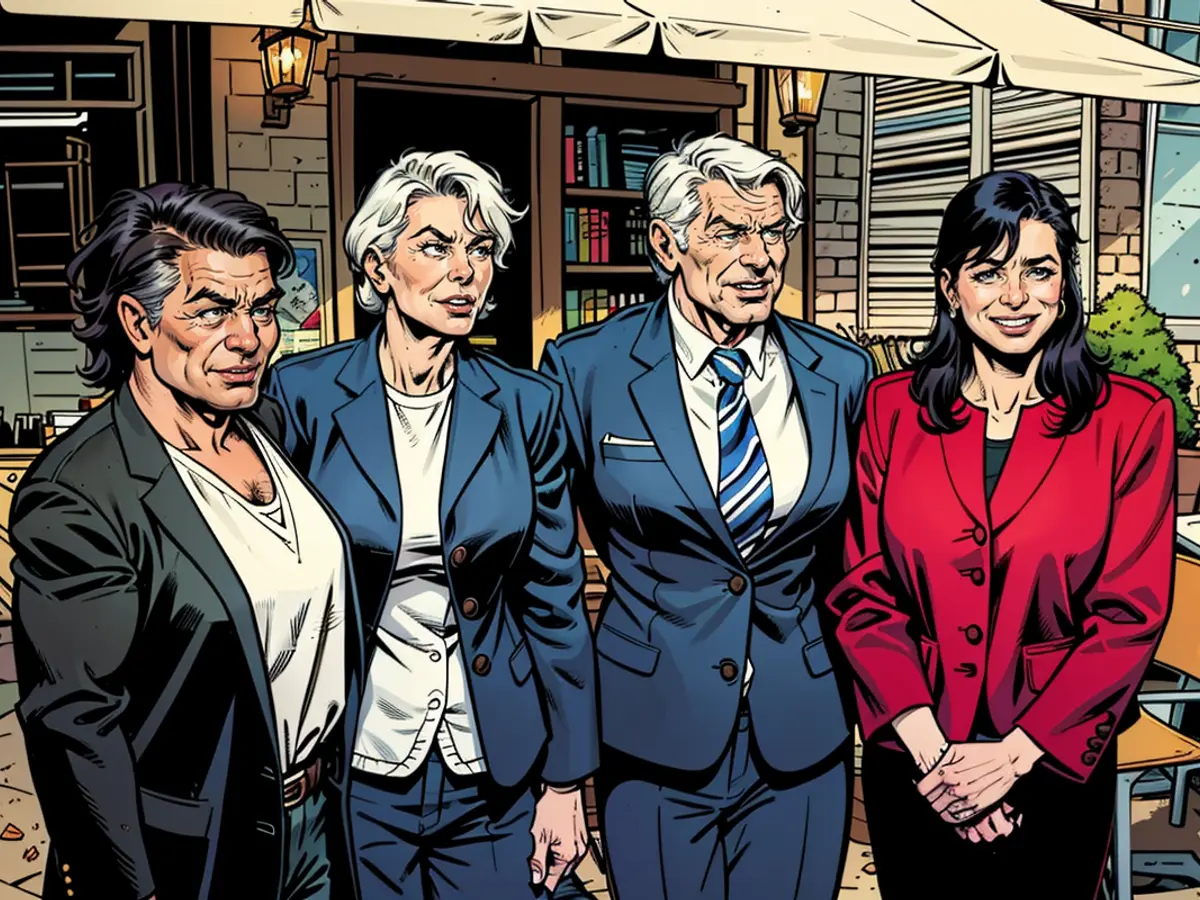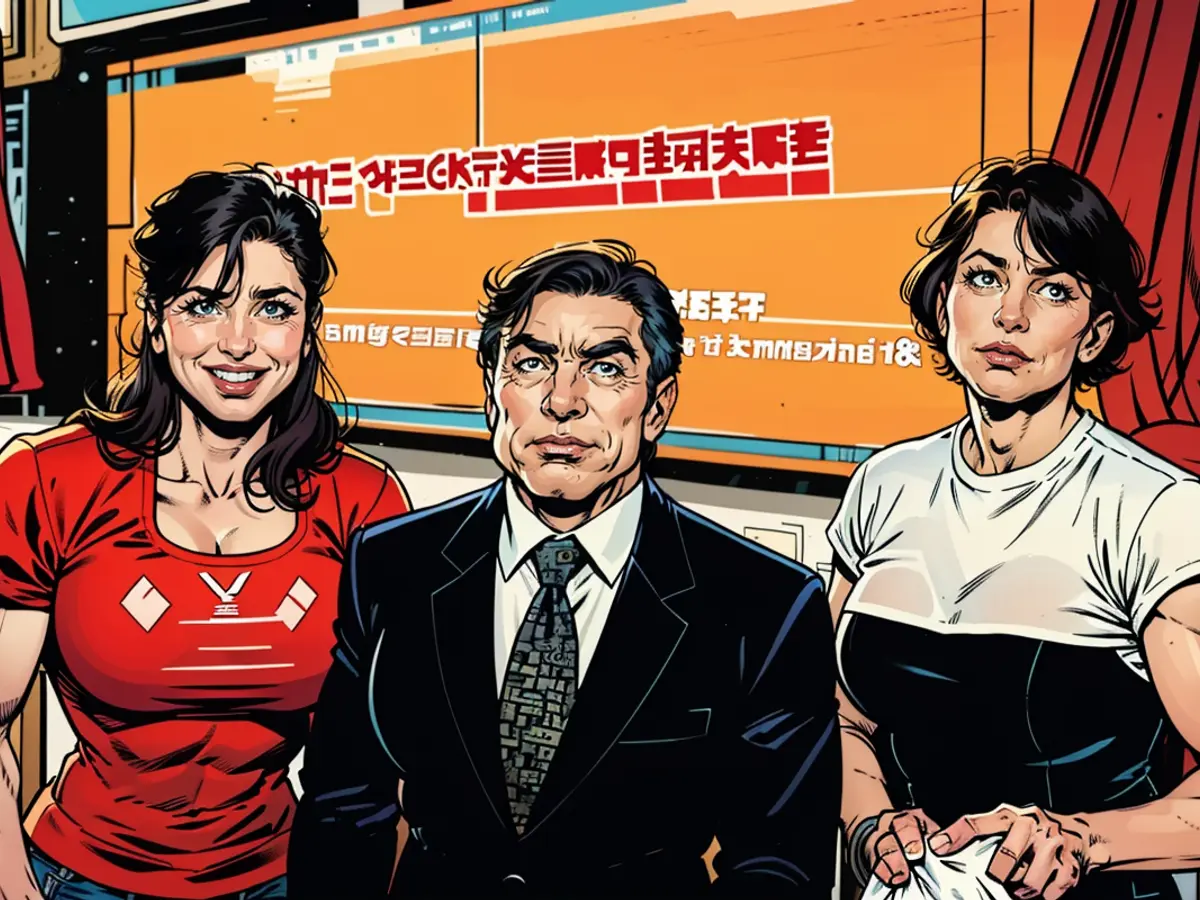China allegedly undermining German authority is hinted at, with evidence pointing towards Cologne City Hall.
The insatiable power ambition of China's President Xi has no bounds, figuratively speaking: Through covert operations, Beijing subtly impacts the lives of Chinese expats residing in Germany and their offspring. The political sphere of Germany is also under China's watchful eye, as evident in the case of a senior official in Cologne city hall.
In the spring of 2017, prominent Chinese businesspeople submitted a charter document to the local tax office in Cologne to form an association. At first glance, the German Zhejiang Business Association e.V. (DZU e.V.) appears to be an innocuous gathering of East Asian immigrants aiming to strengthen their businesses through group networking. However, this appearance might be misleading. The association undoubtedly harbors a political motive.
As per the association's website, DZU aims to contribute to the development and progress of the ancestral homeland and promote the peaceful reunification of China, while strongly opposing the 'Taiwan independence' movement. The merchants of the Rhine Valley also aim to assist in "anti-independence" efforts overseas, evidently strengthening the bond between the Chinese diaspora and the People's Republic of China. Is DZU e.V. attempting to sow discord within German society by aligning with Beijing's communist regime?
Regime Influence Gateway
It may seem peculiar that local entrepreneurs in Cologne are expressing opposition to Taiwan's independence and actively working against its democratic government. However, according to ntv research, there seems to be a well-thought-out plan behind this. The association maintains close ties with the so-called 'United Front', which is a strategy developed by the Communist Party of China (CPC) to assimilate all associations and influential individuals outside the party into its sphere of power and influence.
Since Xi Jinping assumed power in China in 2012, the 'United Front' strategy has been expanded abroad to unite the approximately 60 million 'overseas Chinese'. For years, the communist regime has referred to the 'United Front' as its 'magic weapon'. Associations like the Cologne merchants' association appear to be central to the strategy, as suggested by the founding assembly.
High-ranking Chinese representatives were also present at the association's inaugural meeting held at the Hotel Hyatt Regency Cologne in June 2017. In front of an esteemed audience of 380 guests, Zheng Xuhan was elected as the association's first president, a local entrepreneur. Joining the board was Zhang Xiangguo, another businessman with ties to several Chinese associations in Germany and close connections to the 'United Front' in China. He has had numerous meetings with representatives of the communist party department in the People's Republic.
For a newly formed local association in Cologne, the turnout of well-wishers was overwhelming: The director of the economic and trade office of the Chinese consulate general in Düsseldorf, the deputy head of the ministry of commerce in Zhejiang, and representatives from the city of Cologne were all present. Over a hundred congratulatory messages from home and abroad were received, boasted the association later. Among these messages was one from the office for foreign affairs and overseas Chinese affairs of the Zhejiang provincial government, which falls under the jurisdiction of the 'United Front'.
'United Front' Brings the Taiwan Question to Germany
A primary objective of the world-wide 'United Front' initiative of the CCP is to impose a particular stance on the Taiwan issue. As a result, many diaspora associations aligned with the regime, including those in Germany, express their views on the matter. The objective is apparently to create an impression that all individuals of Chinese descent share the same stance on Taiwan - namely, favoring reunification with mainland China.
If this dispute is introduced into the ranks of Chinese immigrants, it has the potential to create significant internal strife within the German society: German descendants of Chinese origin may feel pressured to publicly support Beijing's position.
Furthermore, the Cologne association's position paper may further widen the divide between the overseas Chinese and their host country. How else can one interpret the call for "anti-independence"? After all, the German government has robust economic ties with democratically governed Taiwan and maintains positive political relations as well. A 'win-win' scenario, as claimed by association representatives, does not exist for Germany.
Official representatives of the city of Cologne attending the association's inauguration raises some questions. The city press office declined to comment, stating that they were unaware of the local association's connection to the Chinese regime. The written response from the city officials stated, "The DZU e.V. is known to the city of Cologne as a business association. The city of Cologne does not have information as described in the question."
United Front Contact in City Hall
However, the ties to the regime extend even to the city hall. A leaked list of 'United Front' contacts in Germany includes a woman who has been working closely with the Cologne city government for years. Zhou Meng serves as the head of the China consultancy Join Universe on the Rhine and is listed as the city's 'China consultant and economic envoy'. In photos dating back several years, Zhou is seen posing with former Mayor Jürgen Roters (SPD) and his successor, Henriette Reker (independent), as well as the then-ambassador Shi Mingde, holding an article about Zhou.
Cologne and Beijing are sister cities. When Mayor Reker traveled to China with a high-ranking city delegation, Zhou Meng accompanied her. Along with the German-Chinese business consultant, the delegation visited a Huawei plant and subsequently met with a high-ranking official from the 'United Front' apparatus. Ji Lin, the chairman of the Political Consultative Conference of the city of Beijing, appointed the Cologne businesswoman Zhou as the capital's 'overseas consultant'. Zhou then guided the Cologne mayor to a Beijing TV show, which was watched by 200 million viewers.
Interviewed Individual Refutes Links but Confirms Association Membership
When RTL raised concerns about Zhou's ties to the Communist Party's power structure, her initial response was a denial. "I am not a member of the 'united front,'" she stated in writing. "I have no direct connection with the 'united front.'" However, she later qualified her statement, acknowledging her election as a member of the "China Overseas Friendship Association" in 2019. This organization falls under the "united front" apparatus, reporting to the 'Chinese Overseas Chinese Affairs Office,' and serves as a primary tool for foreign influence.
In 2016, Zhou was designated as the "Overseas Advisor to the Political Consultative Conference of the City of Beijing." She now sees herself as a "bridge-builder," as she puts it. She believes that her work for both sides is an advantage. "In my dual role as 'China advisor and economic ambassador' of Cologne and 'overseas advisor' of the Political Consultative Conference of Beijing, I can best perform the bridge function for cultural and economic exchange between the two cities," explains Zhou. She denies that the Beijing interlocutors of the Cologne economic delegation were once part of the United Front. "The Political Consultative Conference is an organization of representatives of democratic parties and independent personalities," writes Zhou Meng. However, this is the very purpose and essence of the "United Front": to align and integrate actors outside the CPC into the communist apparatus, with the Consultative Conference playing a central role.
City Hall Unaware, Reker Continues to Travel
The city authorities do not seem interested in Zhou Meng's connections to the "United Front." It's striking how indifferent top city officials appear to be about who they meet in China. The Cologne delegation met Ji Lin in 2016 "as chairman of the Political Consultative Conference of the City of Beijing," according to the press office. It seems that the Political Consultative Conference's affiliation with the "United Front" is not known in city hall. Despite this, Cologne has maintained a robust relationship with Beijing for years, with Mayor Henriette Reker visiting the country frequently, including trips to Beijing and Shanghai last year and several East Asian visits before the pandemic. Chinese officials view Reker positively, even reporting her re-election in 2020 with "almost 60 percent of the votes" on official Chinese websites.**
The relationship between Cologne and Beijing provides a glimpse into how the "United Front" operates in Germany. Similarly, high-ranking officials in other cities, such as Düsseldorf, Frankfurt, Schwetzingen, and Hamburg, maintain connections with Chinese authorities. Personal relationships are built and developed within political circles to benefit the People's Republic, with fellow countrymen closely tied to the motherland and the CPC. For several months, RTL attempted to contact the German Zhejiang Company Association. However, repeated calls and emails went unanswered, with no response from the association's chairman, Zheng Xuhan. The activities and connections of Chinese merchants in Cologne offer insight into the strategic and political nature of China's infiltration of German society, with few in Germany yet aware of the danger.
The entire investigation can be found in the book "ChinaLeaks: Peking's Secret Network in Germany" by Markus Frenzel, published on October 14.
In light of these revelations, it's worth considering whether The President of China, Xi Jinping, approves of such covert influences in Germany through associations like DZU e.V., given its close ties to the 'United Front' strategy.
Furthermore, Zhou Meng, listed as the city of Cologne's 'China consultant and economic envoy', has a history of working closely with Chinese officials and has been designated as an 'overseas consultant' by Ji Lin, the chairman of the Political Consultative Conference in Beijing. This raises questions about the extent of China's influence within German city halls, including Cologne.









